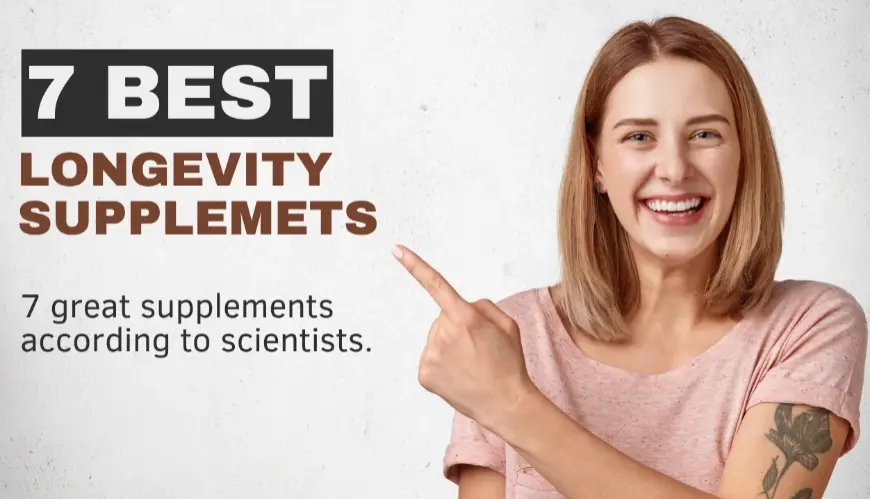People have always wanted to live longer and healthier. Now that we know more about food and health, we can pick and eat supplements that might help us live longer. Remember, no supplement can make sure you'll live longer. But some supplements can maybe help, especially if you eat well, exercise, and live a healthy life.
Here's a list of seven great supplements that researchers think might help you live longer:
Omega-3 Fatty Acids
What Are Omega-3 Fatty Acids?
Omega-3 fatty acids are healthy fats important for your body. They're mostly in fatty fish but also in fish oil capsules as supplements.
Health Benefits
- Less Inflammation: Omega-3s help reduce inflammation in your body.
- Heart Health: They lower bad cholesterol and raise good cholesterol, reducing heart disease risk.
- Brain Benefits: Studies say omega-3s might protect against Alzheimer's and dementia.
Who Should Take Them?
If you don't eat fatty fish like salmon or mackerel often (like twice a week), a supplement could be good for you. There are also special omega-3 supplements for vegetarians or people allergic to fish.
How Much to Take
Generally, taking 250–500 mg of EPA and DHA (the best omega-3s) every day is recommended.
What to Look for in a Supplement
Choose a supplement that's been tested for quality. Make sure it has EPA and DHA, and that it comes from a good source.
Medical References
- The American Heart Association says eating fish with omega-3s or taking supplements is good for your heart.
- Harvard Medical School gives advice on who might need omega-3 supplements.
It's always a good idea to talk to a doctor or health expert to see if omega-3 supplements are right for you.
Resveratrol
What Is Resveratrol?
Resveratrol is a substance found in red wine, grapes, and some berries. People take it as a supplement because they think it might help them age slower.
Health Benefits
- Anti-Aging: Resveratrol turns on certain genes that may help cells live longer.
- Heart Health: It can reduce inflammation and lower bad cholesterol, which is good for your heart.
- Brain Benefits: Some studies show it might help protect your brain and improve how it works.
Who Should Take It?
Resveratrol might be worth trying if you're interested in its possible benefits for living longer, especially if you're worried about heart disease or your brain getting weaker.
How Much to Take
People usually take between 150 and 500 mg per day, but the right amount can vary.
What to Look for in a Supplement
Choose a supplement that's been checked for quality. Look for ones that list the amount of "trans-resveratrol," the best form of this substance.
Medical References
- Mayo Clinic talks about how resveratrol is good for your heart.
- A study in the Cell journal looks at how resveratrol helps with living longer.
Remember, it's important to talk to a doctor before starting any new supplement. Resveratrol seems promising, but we need more research to really understand its effects on how long we live.
Vitamin D
What Is Vitamin D?
Vitamin D is called the "sunshine vitamin" because you can get it from sunlight. But if you don't get much sun, especially in the winter, or if you live somewhere not very sunny, you might need extra Vitamin D from supplements.
Health Benefits
- Bone Health: Vitamin D is super important for your bones and teeth because it helps your body use calcium.
- Immune System: It helps boost your immune system, so you can fight off sicknesses better.
- Preventing Diseases: Some research shows that enough Vitamin D can lower the chance of diseases like heart problems.
Who Should Take It?
If you don't get enough Vitamin D, live in a place with not much sun, or worry about your bones or heart, you should think about taking Vitamin D supplements.
How Much to Take
How much you need depends on your age and other things, but adults usually take about 600 to 800 IU (International Units) each day.
What to Look for in a Supplement
Try to find Vitamin D3 supplements because they work better than D2 in your body. Also, make sure the product has been checked for quality.
Medical References
- The National Institutes of Health has lots of info on Vitamin D, like why it's good for you and how much to take.
- A study in JAMA talks about how Vitamin D can help prevent chronic diseases.
Always talk to a doctor or health expert before you start taking any new supplement, especially if you're already taking other medicines or have special health needs.
Curcumin
What Is Curcumin?
Curcumin is a special ingredient in turmeric, a spice used a lot in Asian food and old-school medicine. It's known for its bright yellow color and its ability to fight inflammation and protect your body.
Health Benefits
- Fights Inflammation: Curcumin is really good at reducing swelling and pain, sometimes as well as some medicines, but without bad side effects.
- Antioxidant Power: It helps your body fight harmful molecules and makes your body's own defense system stronger.
- Preventing Diseases: Since long-term inflammation can lead to many illnesses, curcumin might help stop these problems from starting.
Who Should Take It?
People with ongoing pain, swelling, or tummy troubles might find curcumin supplements helpful. It's also good for anyone wanting to stay healthy and possibly live longer.
How Much to Take
People usually take between 500 and 2,000 mg of curcumin each day. But your body doesn't absorb it easily, so find supplements that include black pepper or piperine to help your body use it better.
What to Look for in a Supplement
Pick a high-quality supplement that's been checked for purity. It should have piperine or be made in a way that your body can absorb it well.
Medical References
- The Arthritis Foundation talks about how curcumin helps with swelling and pain.
- A study in the Journal of Medicinal Food shows how curcumin can prevent diseases.
Remember, it's important to talk to a doctor before you start any new supplement, especially if you're already taking other meds or have health issues.
Coenzyme Q10 (CoQ10)
What Is Coenzyme Q10?
Coenzyme Q10, or CoQ10, is kind of like a vitamin. Your body makes it naturally. It helps cells grow, stay healthy, and make energy.
Health Benefits
- Making Energy: CoQ10 is really important for creating ATP, a tiny molecule that gives energy to your cells for all sorts of jobs.
- Heart Health: It's good for your blood vessels and heart, and many people take it for heart problems.
- Statins and CoQ10: People taking statin drugs (for cholesterol) often have lower CoQ10 levels, so they might need extra.
Who Should Take It?
CoQ10 is often suggested for older people because their bodies might not make enough of it. It's also good for those on statins or with heart issues.
How Much to Take
Usually, people take 100 to 200 mg of CoQ10 each day. Sometimes, doctors recommend more for certain health problems.
What to Look for in a Supplement
Find a CoQ10 supplement that's been tested for safety and quality. There are two types, ubiquinol, and ubiquinone; ubiquinol is absorbed better by your body.
Medical References
- The Mayo Clinic talks about what CoQ10 does and its benefits.
- A study in the European Heart Journal shows how CoQ10 can be good for your heart.
Always check with a healthcare provider before you start any new supplement, especially if you have health issues or are taking other medicines.
Green Tea Extract
What Is Green Tea Extract?
Green tea extract is like a super strong version of green tea. It has all the good stuff from green tea, like catechins and flavonoids, but in a more powerful form.
Health Benefits
- Full of Antioxidants: The catechins in green tea are really good at fighting off damage to your cells.
- Better Brain Health: Stuff like EGCG in green tea can protect your brain and maybe make it work better.
- Heart Health: These antioxidants can also lower bad cholesterol and make the balance between good and bad cholesterol better.
Who Should Take It?
Green tea extract is great for pretty much anyone, especially if you're interested in keeping your heart healthy, slowing down aging, or boosting your brain.
How Much to Take
Usually, taking 250–500 mg per day is safe and works well.
What to Look for in a Supplement
Pick a supplement that tells you how much EGCG it has and that has been checked for being safe and pure. Avoid ones with fake fillers or stuff added to keep it fresh.
Medical References
- A study in the Journal of the American College of Nutrition shows how green tea helps your heart.
- Research in Molecular Nutrition & Food Research looks at how EGCG is good for your brain.
Remember to talk to a doctor before starting any new supplement, especially if you're already taking medicines or have health issues.
Probiotics
What Are Probiotics?
Probiotics are tiny living things like bacteria and yeasts that are actually good for your stomach. They're called "good" bacteria because they help keep your gut healthy.
Health Benefits
- Digestive Health: Probiotics balance the good bacteria in your stomach, helping with digestion and how your body uses nutrients.
- Immune Support: A healthy gut helps your immune system, so you get sick less often.
- Less Inflammation: Probiotics can reduce inflammation, which is linked to lots of different illnesses.
Who Should Take It?
If you have tummy troubles, get sick a lot, or think your gut bacteria is out of balance, probiotics might help. They're also good for overall health and living longer.
How Much to Take
Probiotics come in different types and strengths, usually counted in CFUs (colony-forming units). A usual dose starts at about 5 billion CFUs each day, but it's best to ask a healthcare expert what's right for you.
What to Look for in a Supplement
Find a probiotic that's been checked for quality and lists the specific bacteria strains it has. Some are made for certain health needs, like digestion, immune system, or women's health.
Medical References
- Harvard Medical School talks about why probiotics are good for you.
- A study in Nutrition Research shows how probiotics help your immune system.
Always chat with a doctor before taking new supplements, especially if you're already on other medications or have health issues.
Things to Remember
These supplements could be really helpful, but don't forget:
Talk to a Doctor - Before you start taking any supplements, always check with a healthcare expert. They can give you advice that fits your health needs.
Choose Good Quality - Make sure you get high-quality supplements from trusted brands. Cheap or fake supplements might not work and can even be bad for you.
Eat Real Food Too - Try to get your nutrients from foods like fruits and vegetables. Supplements are extra help, not a replacement for healthy eating.
While we all wish for a magic way to live longer, staying healthy involves many things. Taking supplements along with eating right, exercising, dealing with stress, and regular doctor visits is the best way to live a long and healthy life.




